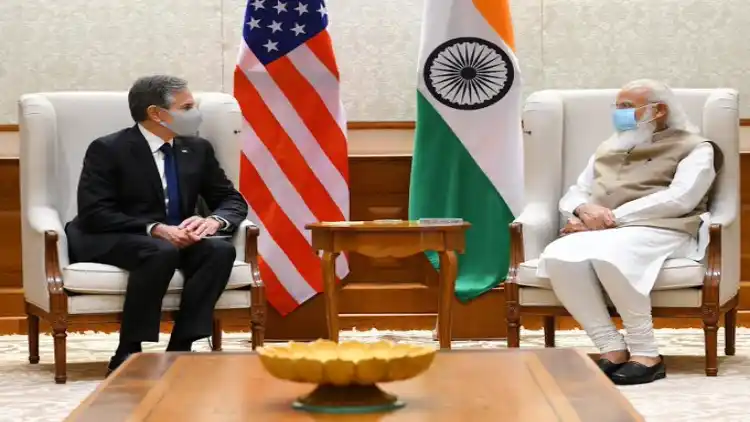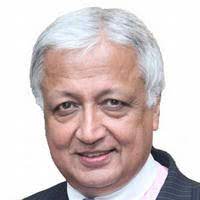

 Deepak Vohra
Deepak Vohra
There is global Kashmir fatigue despite Pakistani-funded attempts through some overseas Kashmiris and sections of the international media to keep the issue alive.
It is one thing to make statements when one is not in a leadership position or a position of authority. It is quite another issue when the burden of office and its concomitant limitations of speech and action sit upon one’s shoulders.
Remember Kamala Harris’s niece tweeting about the farmers’ protest? She got a sharp rap on her knuckles and has since shut up.
The fellow in Canada has some Khalistanis in his Cabinet (and even brought one of them to India), but now sings hosannas to our Prime Minister.
Joe Biden in his first foreign policy speech as President talks of following America’s “naked self-interest” and says that if the USA invests in itself and in Americans, no country on earth, neither China nor any other country on earth, can match America.
The century just gone by will be remembered for:
America acquired unrivalled military and economic and soft power (Coca Cola, Google, Apple, Microsoft et al) that gave it tremendous political influence. America led the free world for most of the last century and developed global respect and admiration among the people of the world, despite its frequent arrogant ill-advised escapades that hurt many people, and thrilled others.
Then 9/11 came along and America discovered that it was not invincible just as China discovered in 2020 in the Galwan Valley. And the financial crisis of 2008 followed.
However, America bounced back.
In our own country, Punjab and Kashmir and the Northeast have been through stormy times. They and the rest of the country suffered hugely. But then the spirit of Mother India, Bharat Ma, triumphed and India was back where it is destined to be.
It does not matter who raises the Kashmir issue. It is deader than a dodo except for those who see it as the goose that lays the golden egg. Remember an imbecile called Shri IK Niazi?
Someone probably told Niazi about the 17th century English poet John Milton’s line in his poem “On his blindness” (Milton was blind when he wrote it) that “they also serve who only stand and wait”. So, in August 2019, he asked Pakistanis to stand for half an hour after Friday prayers so that a miracle might happen in Kashmir.
When nothing happened for a year, in a media interview he threatened war with India and lamented that “we have knocked on all doors (about Kashmir) and we will keep doing so.” Then he tried to form a parallel OIC and lost his access to the Saudi and the UAE funding. The poor man does not realize that the world’s interest in Kashmir has seriously waned, as it has in Palestine.
What will define India-USA relations in this decade? Certainly not Kashmir.
Despite its obnoxious triumphalism and arrogance, the American dream of liberty, the freedom of choice and the choice of freedom, is a universal desire, shared by billions.
A phone call between the newly elected US President within weeks of his swearing-in in January 2021 and the Prime Minister of India and two phone calls between the Ministers of Foreign Affairs of the two countries in the space of two weeks are remarkable.
The US Defence Secretary came to India some weeks ago and the Secretary of State has just come (during his visit he met with a representative of the Dalai Lama. I have never seen this level of coordination of policies and priorities between the two countries.
In the 1990s, India was the go-to nation for IT issues. Now it leads the world in the manufacture of pharmaceuticals. It is a world leader in fighting climate change and terrorism. India is right up there in harnessing clean energy, especially solar. So, which country does India have of similar values to define our brave new world? America.Which country does America have of similar values to define our brave new world? India.
Both peoples want the freedom of choice and have made the choice of freedom. We had bridges of friendship, now we have built the highways of understanding. India-USA relations will go far, far beyond Kashmir.
Some years ago, a senior American official (with strange links to Pakistan) had questioned the Instrument of Accession of Kashmir to India. Last year, she was raided by the FBI for sharing secrets with Pakistan.
Having traversed a rocky trail, the best definition of the new US-Indian relationship is the catch line of the old Virginia Slims advertisement of the 1970s: You’ve come a long way baby!
And for those enlightened Americans who prefer free and democratic India over repressive and murderous China, I respond with another catch line from a mid-1990s Indian Pepsi advertisement: Yehi hai right choice baby!
It had to happen; it is the inexorable march of history, with the synergies now clearly evident. 2,500 years ago, a thinker named Chanakya had wisely said that there can be no friendship without self-interest.
What are the six major challenges for our virus damaged world and what is the self-interest of India and the USA in forging ever closer ties?
China, of course, is the elephant in the room, but there are also other issues. India-US relations will not be posited solely on common animosity to China.
Artificial intelligence needs young minds (India).
Free trade needs open sea lanes (India).
Healthcare needs a medical superpower (India).
Manufacturing for the world needs a powerhouse that will not seek to dominate it (India got massive FDI in 2020.)
Climate change (declining food production, water stress) needs a commitment of net zero emissions by 2050 (India/USA).
Anti-terrorism (in 2019 of 163 countries surveyed representing 99.7% of the world’s population, 120 faced terrorist attacks) needs global coordination (India).
Underlying it all is democracy. The US Defence establishment now looks at us with new respect, as we have proved our mettle by thrashing China. Only power can contain power. In the free world, India and America are two powerful militaries that know how to fight.
Even when our minds disagreed with what the US did, our hearts were always with it.
One doesn’t need to be a rocket scientist to understand that the US no longer wants to go it alone, reflecting its self-perception that it is too expensive to be the sole Rambo of the world.
It has a poor relationship with Russia and China. It cannot afford to offend India.
Secretary of State Anthony Blinken recalled during the 2020 Presidential campaign that President Joe Biden sees India-US as “natural partners” and had said in 2006: “my dream is that in 2020, the two closest nations in the world will be India and the United States”
The US and the world have made a strategic bet: that India will play a major role in shaping our new world. In an era of evident confrontation with that rogue nation called China this wager will have a major impact on the future trajectory of our planet. I am convinced that the world will win this bet.
A resurgent India has given the free world a favourable balance of power in the Indo-Pacific region. A more capable India also has a rallying effect on other regional democracies, such as Japan and Australia that seek to avert a future in which they become tributaries of Communist China.
I have been in diplomacy for 48 years and counting. We believe in quiet discussion and persuasion and gentle dialogue. We do not threaten Armageddon every time another country disagrees with us. That is why our diplomacy is so successful, skeptics notwithstanding.
In the half-century after the Second World War, the US sought alliances wherever it could, to contain the communist threat. Along with many other nations, we preferred nonalignment. Our relationship remained in a state of stasis. America saw us as Soviet sidekicks, we saw the USA as a big bully.
In the mid-1960s, with India’s agriculture in deep stress (monsoon failure, war, infestations) India received 9 and 11 million tonnes of US food grains under America’s PL-480 programme. This was the largest import of food in human history, but in its handling, it became a public relations disaster.
Our opposition to the Vietnam War is well remembered. What did the US do? They held up food supplies during the year of our drought (feeding us ship to mouth, each shipload requiring approval by the President) when our land lay cracked and gaping all the way to Delhi.
In 1971, the attempt to coerce India in favour of Pakistan (even though we had never been a security threat to the USA) is still remembered. US misreading of the Bangladesh crisis greatly damaged bilateral relations.
Bill Clinton, angry that his intelligence fellows knew nothing about our May 1998 tests, warned that “we will come down on those guys like a ton of bricks,” although during the 1999 Kargil War he tried to be helpful by pushing Pakistan to withdraw.
Prof Dennis Klux’s seminal work India and the United States; Estranged Democracies covers the period 1941-1991.
The collapse of the USSR in 1991 saw a reassessment on both sides of their relationship, more on our side as major perceived irritants were removed – the US mollycoddling of Pakistan and India’s soft corner for the USSR.
9/11 brought home to America the danger of Islamic terrorism, something we had been suffering since the late 1980s. Now America wanted to co-opt us in the global war on terror.
Over the past 20 years, our bilateral relationship with America has strengthened, in every sector from defence to IT to space to people-to-people contact to nuclear energy to health (vaccines). America’s China fantasy (since 1972) has soured.
India’s capability has a reassuring effect on other regional democracies, such as Japan and Australia, that do not wish to be tributaries of Communist China.
During President Trump’s February 2020 visit, the India-US relationship was declared a Global Comprehensive Strategic Partnership.
Nations form friendships or alliances when their economic interests or security are threatened. The USA has very little history but is a seductive paradigm.
The reinvigorated relationship between India and America had to happen it is the inexorable march of history. Kashmir is not enough to damage India-USA relations.
Deepak Vohra is a senior diplomat, special Advisor to Prime Minister on Lesotho, South Sudan and Guinea-Bissau and Special Advisor to Ladakh Autonomous Hill Development Councils, Leh and Kargil)
